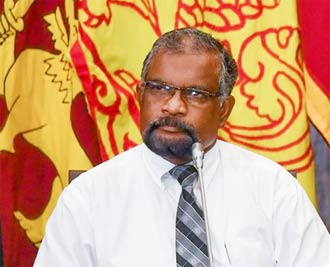Sunday Feb 22, 2026
Sunday Feb 22, 2026
Friday, 5 July 2024 04:27 - - {{hitsCtrl.values.hits}}
 |
| President Ranil Wickremesinghe |
 |
| Treasury Secretary Mahinda Siriwardena
|
Most analysts yesterday described that the deal struck on $ 12.5 billion stock of International Sovereign Bonds (ISBs) by the Government and majority of the creditors was favourable whilst the Finance Ministry said it was “fair”.
“The negotiated Joint Working Framework enables a fair sharing of upside or downside between creditors and Sri Lanka in case of an economic over-performance or under-performance by Sri Lanka,” the Finance Ministry said.
It added that any upside payouts would only occur in a manner that does not compromise Sri Lanka’s longer term debt sustainability.
“The risk of higher payouts being triggered whilst capacity to pay is weak is mitigated by the inclusion of a control variable. Therefore, any increased payments would to a great extent be balanced by enhanced capacity to pay,” it said.
“The baseline scenario results in a NPV effort of 40% at a discount rate of 11% whilst the scenario with the highest payments by Sri Lanka (resulting from the most significant economic over-performance) would result in a NPV effort of 27% at a discount rate of 11%,” Finance Ministry added.
The Macro-Linked Bonds (MLB) structure, following the adjustments made through the evolution of the proposed instrument, enables the appropriate sharing of upside between creditors and the debtor, whilst also ensuring that in this process, the debt sustainability of the debtor sovereign is not compromised, added the Finance Ministry. See Page 9 for the detailed statement from the Finance Ministry.
Verite Research said the instruments used include a novel Governance-Linked Bond (GLB) which it designed. “Sri Lanka will lead history as the first country to engage this novel governance linked instrument,” Verite added.
The Verité-GLB is designed to adjust repayments downwards (coupon step-down) in response to the country achieving mutually agreed governance outcomes. “When the benchmarks are met, the country gets a repayment reduction, and bondholders get a de-risking dividend – everyone wins (potentially),” Verite Research Executive Director Dr. Nishan de Mel said.
Financial sector analysts said the deal was favourable given Sri Lanka’s own challenges and opportunities. They expressed the hope that the agreement could be signed and sealed within the next two months or before the scheduled Presidential polls by mid-October.
Capital Alliance Research said under the baseline scenario:
The Joint Working framework is required to be confirmed by: 1) Official Creditor Committee – which includes the Paris club and other bilateral lenders, to ensure comparability of treatment across the creditor categories 2) IMF Staff – to ensure that the proposed framework aligns with debt sustainability objectives within the IMF program.
Sri Lanka hired globally renowned financial advisors Lazard Frères and legal advisors Clifford Chance to support the process of restructuring the debt and $ 12.5 billion worth ISBs accounts for 45% of total central government external face amount of debt of $ 37 billion as of end 2023.
